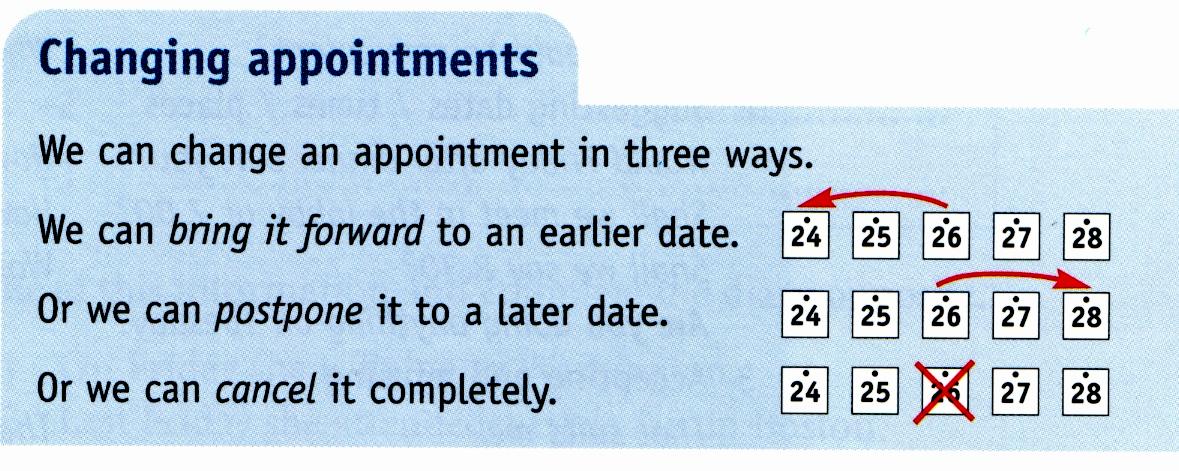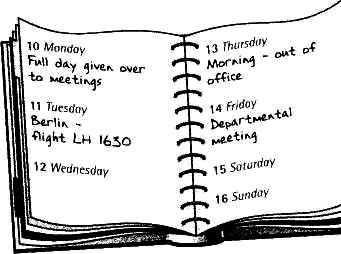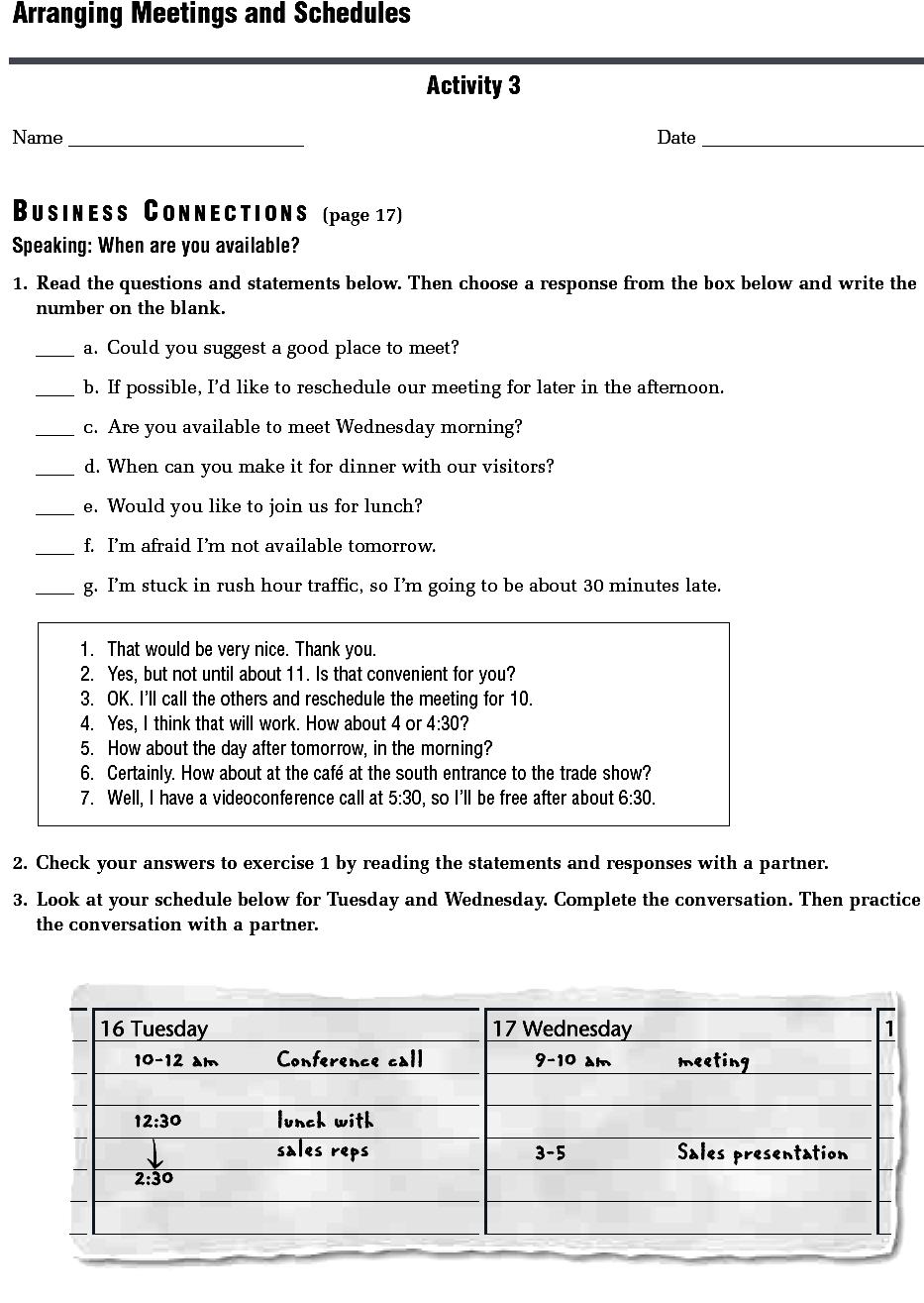
- •Англійська мова методичні вказівки
- •0305 Економіка та підприємництво та
- •0306 Менеджмент і адміністрування
- •Київ нухт 2008
- •Telephoning
- •Introduction
- •Unit 1 phones and numbers
- •Information line
- •Unit 2 getting through
- •Listen carefully to the caller’s request, and decide whether or not you can deal with it.
- •Unit 1-2 revision
- •Exercise 7. Basic Vocabulary – Getting Connected 2 Complete the text using the words from the box in the necessary form.
- •Exercise 9. Cell-phone Etiquette
- •The "ins and outs" of telephoning in north america
- •Unit 3 messages
- •Phonetic Alphabet / International Spelling List for the Phone
- •Unit 4 arrangements
- •Units 3-4 revision
- •Exercise 4. Getting Through to the Boss
- •Exercise 5. Leaving a Message There are a number of phrases and idioms that are only used when telephoning. Complete the following dialogue, using telephone vocabulary.
- •Unit 5 complaining
- •Exercise 3. Read the dialogue below and answer the questions which follow.
- •Activity4. Dealing With a Complaint
- •Activity 5. Making a Complaint
- •Unit 6 problems. Dealing with problems Problems
- •What to Say When There's a Problem
- •Activity4 Good News, Bad News
- •Units 5-6 revision
- •6 Easy Steps to Follow Up by Phone
- •The Nuisance of Overheard Calls
- •Unit 7 social talk on the phone The reason computers can do more work than people is that computers never have to answer the phone.
- •Calling someone you don't know
- •Remember…
- •Telephoning tips
- •Sample Telephone Self-assessment Checklist
- •Social Tips
- •Cross Cultural tips
- •Activity 3. Culture File Feelings
- •Handling Calls
- •Asking Politely
- •Making Calls
- •1. Questionnaire
- •2. Telephone expressions
- •3. A telephone call
- •4. Finding Out
- •Unit 8 texting
- •Acronyms
- •Contractions
- •Text Messaging Abbreviations
- •Supplement role play communication
- •1 Beginning a Call
- •2 Ending a Call
- •3. Consolidation 1
- •4. Connecting People
- •5. Messages 1
- •6. Messages 2
- •7. Consolidation
- •8. Appointments and Arrangements
- •9. Recorded Information 1
- •10. Recorded Information 2
- •11. Messages 3
- •12. Messages 4
- •13 Consolidation
- •1. Beginning a Call
- •2. Ending a Call
- •3 Consolidation 1
- •4. Connecting People
- •5. Messages 1
- •6. Messages 2
- •7. Consolidation Plus
- •8. Appointments and Arrangements
- •9 Recorded Information 1
- •10. Recorded Information 2
- •11. Messages 3
- •12. Messages 4
- •13. Consolidation
- •Role Playing Suggestions
- •1. Requesting Travel Information
- •2. Product Information
- •3. Leaving a Message
- •4. Selling Your Product
- •Game: Requesting Information Teacher's Notes
- •Game idea
- •Playing the game
- •Speaking
- •Some More Role plays
- •Методичні вказівки
- •0305 Економіка та підприємництво та
- •0306 Менеджмент і адміністрування
Unit 4 arrangements
A Making Arrangements
You get through to the person you want to speak to and fix a meeting.
Telephoning |
Answering a call |
||||
Can/Shall we fix/arrange an appointment/a meeting? Would it be useful to meet up soon? How about Monday? What about Tuesday? Would Wednesday be suitable? Would Thursday suit you? Shall we say Friday? |
I'll (just) get / check my diary.
That's fine. I can't / won't be able to make Monday. I've got to (+infinitive) / a (+ noun) . |
||||
Asking about availability |
|||||
Would it be possible to meet? Do you want to meet up? (inf.) When are you free? (inf.) |
When What time Where |
would
|
suit you?
be convenient for you? |
||
Suggesting times/dates/places |
Saying Yes |
Saying No |
|||
Would Friday after dinner suit you? Can you make/manage 2 o’clock on Thursday? Are you doing anything on Tuesday? (inf.) How about on the 26th? (inf.) Are you free at 3.30? (inf.) Shall we say 8.30? (inf.) Would 8.30 be OK? (inf.) |
Yes, that time suits me. Yes, I’m free. Yes, that’s fine. |
I’m afraid… I can’t make/manage it. I’m tied up. |
|||
Confirming |
|||||
So that’s 7 o’clock on Wednesday, then. I’ll look forward to seeing/meeting you on Tuesday at ten, then. |
See you on Tuesday at ten, then. Great. I look forward to it. |
||||

B Closing the Conversation
Here are some ways of finishing a conversation without sounding abrupt (rude).
Telephoning |
Answering a call |
See you on Friday then. I'm going to have to go now. I've got to go to a meeting/ go and see someone. OK. I’m sorry but I have to go. The other line is ringing. |
Yes, I'll look forward to seeing you on Friday. |
(It's been ) nice talking to you. Good to talk to you.
|
Nice talking to you. (It's been) good talking to you. |
Talk to you soon, no doubt. We'll be (back) in touch soon. I’ll get back to you next week. Look forward to hearing from you soon. |
Thanks for calling/phoning. |
Some Other Ways to Close a Conversation
Telephoning |
Answering a call |
OK. I think that’s everything. That’s all for the moment. |
(Is there) Anything else? |
Thank you for your help/patience. I’m very grateful for your assistance. |
Thank you for calling. Good bye. Thanks for calling (back). Have a good weekend/trip/holiday. |
C Changing Arrangements

Here are some ways of changing arrangements.
a I can't make Tuesday [Tuesday is not possible]. Something has come up [has occurred to prevent our meeting]. I've got to go over to Berlin to see a client. How about Wednesday?
b I think we said Thursday at 11. Can you make the afternoon instead? [Is it possible for you to meet in the afternoon?]
c I’m afraid we to have to change our arrangement for the 15th. Can we put it off [delay it] till the 22nd? I'd completely forgotten we have a departmental meeting that day.
d I'm afraid Monday won't be possible after all. I'm going to be very busy that day. What about the following week?
e We're going to have to put back [delay] our meeting. I'm completely snowed under [very busy] at the moment. Can we leave it open [decide not to fix a day] for the time being? I'll get back in touch [contact you again] when I'm not so busy.
Practice
Exercise 1. Annelise Schmidt (AS) gets through to James Cassidy (JC) and arranges to meet him. Reorder their conversation, which contains expressions from A and B.
a AS: Fine thanks. I'm going to be in London on Tuesday and Wednesday next week. How about meeting up to discuss how Megabook and Sprenger might work together?
b AS: Hello. This is Annelise Schmidt. You remember we met at the Frankfurt Book Fair last month?
c AS: Look forward to seeing you then. Bye.
d AS: Sounds good. Shall I meet you at your office? I've got the address.
e AS: Yes, that's fine.
f JC: James Cassidy.
g JC: Goodbye.
h JC: I'll just check my diary. I won't be able to make Tuesday. I've got to go to Manchester. Would Wednesday suit you? How about lunch?
i JC: OK. See you on Wednesday at 12.30, then.
j JC: Yes, how are you?
k JC: Yes. Why don't you come round here at about 12.30? Ask for me at reception and I'll come down.
Exercise 2. Look at B again. Which of these conversations sound natural, and which sound strange?
1. A: Nice talking to you. See you on Wednesday.
B: See you Wednesday. Thanks for calling. Bye.
2. A: I'll look forward to seeing you tomorrow, then.
B: Talk to you soon, no doubt. Bye.
3. A: It's been good talking to you. I'm going to have to go. I've got to go to a meeting.
B: Nice talking to you. I'll be in touch soon.
4. A: See you this afternoon at four, then.
B: Yes, we'll be back in touch soon.
5. A: I'm going to have to go.
B: OK. Talk to you soon, no doubt. Bye.
Exercise 3. Match these replies (1-5) to the things (a-e) the people say in C.
I suppose so: it would have been good to meet. Look forward to hearing from you when you're less busy.
The 22nd ... I'm going to be on holiday. What about the 29th?
The afternoon would be no problem. How about at three?
Wednesday's going to be difficult. Can you make the next day?
Yes, the same day the following week would be fine.
Exercise 4. Complete the text using the words from the box.
finish this harder politely ‘Goodbye” call person |
It’s easy to end a phone 1)_____ – just say 2)_____. It’s much 3)_____ to signal the end – to show the other 4)_____ that you want to 5)_____ the call. But there are several ways of doing 6)_____ clearly and 7)_____.
What ways of ending a phone call do you know?
Exercise 5. Fill in the gaps in these sentences from the end of a call.
Give my _______ to Freddie.
Thanks for _______ me back.
_______ a nice weekend.
_______ to you soon.
Role play 1. Practise this conversation with a partner. Take turns to play each role.
Student A |
Student B |
1. You are Mr. Moya’s PA. Answer the phone. |
|
|
2. Say who you are and ask for an appointment with Mr. Moya. |
3. Offer a time/day. |
|
|
4. Agree. |
5. Ask what’s it about. |
|
|
6. Say what it is about. |
7. Confirm the details. |
|
|
8. Say thank you. |
9. Acknowledge B’s thanks. |
|
|
10. Say goodbye. |
Activity 1. Making Arrangements by Telephone.
a) Work in pairs and discuss the questions.
1. Say these dates in English:
a. 10/09/02
b. 24/03/03
c. 01/11/99
d. 14/07/87
2. Say these times in English. Say each time in two ways.
a. 10.30
b. 3.45
c. 10.20
d. 11.05
3. Which expressions do we use with in, at or on?
a. ___ the weekend
b. ___ Wednesday
c. ___ the summer
d. ___ the afternoon
e. ___ 12.30
b) Reading
Two people are arranging a meeting. Read the phone call and complete Elana’s meeting planner.
Michael: Hello, Michael Kennedy.
Elana: Hello, Michael. It’s Elana…
Michael: Hello, Elana, how are you?
Elana: I’m fine, thank you. And you?
Michael: Very well, thanks. What can I do for you?
Elana: I’d like to arrange a meeting with you.
Michael: OK, no problem…
Elana: It’s about the plans for the new employees’ training week.
Michael: Fine. When shall we meet?
Elana: One day next week?
Michael: OK. How about Tuesday in the afternoon? That’s the 15th.
Elana: No, I’m afraid I’m busy all day on Tuesday. What about Thursday or Friday?
Michael: Sorry, I can’t make Friday. I’m on a course. But Thursday is fine. Morning or afternoon?
Elana: The afternoon is best for me.
Michael: OK. Shall we say 2.30?
Elana: Yes, that’s fine. Where shall we meet?
Michael: You’ve got a bigger office!
Elana: OK. So that’s half past two on Thursday 17th August, in my office.
Michael: Right.
Elana: Thanks, Michael. I’ll look forward to seeing you then.
Meeting with: |
|
Date: |
|
Time: |
|
Place: |
|
Reason for meeting: |
|
c) Read the call again. Find and underline one or more phrases which:
say you want a meeting
explain the reason for the meeting
suggest a day or time
agree to day or time
say no and give a reason
ask about the place
confirm the details
Read the phone call again. Practise it in pairs. Take turns to be Michael and Elana.
d) Work in different pairs. Practise making arrangements on the phone. Use the notes to help you. Take turns to be A and B. Start and end the conversation like the one above.
Student A |
Student B |
1. Say you want a meeting. |
|
|
2. Agree. |
3. Say why – to discuss new plans for interviewing job applicants. |
|
|
4. Ask when. |
5. Suggest next Wednesday (the 23rd). |
|
|
6. No – you’re out of the office. Suggest Monday or Tuesday. |
7. You’re busy Monday morning and all day Tuesday. Monday afternoon? |
|
|
8. Agree. Suggest 2.00. |
9. You prefer later. Suggest 3.30. |
|
|
10. Agree. Ask where. |
11. Suggest B’s office. |
|
|
12. Agree. Confirm details. |
e ) Work
on your own. This is your business diary page for next week. Write
down at least four appointments on different days. Write the time and
place.
) Work
on your own. This is your business diary page for next week. Write
down at least four appointments on different days. Write the time and
place.
f) Work in groups of four. You need to arrange a meeting at a time when you are all free. Decide the reason for the meeting and agree when and where it will take place.
Activity 2. Arranging Meetings and Schedules - When are you Available?
a) Read the questions and statements below. Then choose a response from the box below and write the number on the blank.
_____ a. Could you suggest a good place to meet?
_____ b. If possible, I'd like to reschedule our meeting for later in the afternoon.
_____ c. Are you available to meet Wednesday morning?
_____ d. When can you make it for dinner with our visitors?
_____ e. Would you like to join us for lunch?
_____ f. I'm afraid I'm not available tomorrow.
_____ g. I'm stuck in rush hour traffic, so I'm going to be about 30 minutes late.
|
b) Check your answers to 1 by reading the statements and responses with a partner.
c) Look at your schedule below for Tuesday and Wednesday. Complete the conversation. Then practice the conversation with a partner.

Activity 3. Making Telephone Arrangements - Thank you for Calling
a) Read the situation and the conversation below. Then fill in the blanks. Use words from the box and your own ideas.
tomorrow evening/this Friday/next Tuesday/on the 18th/Wednesday afternoon/Friday morning/in the afternoon/earlier/later/for lunch/for dinner
Of course/Sure/Great
I'm busy then/I've got another appointment then/I can't make it then
that's good/that sounds good/I'm free |
Situation: Speaker A is going to Speaker B's city. Speaker A calls Speaker B to arrange a meeting.
B: Hello, this is _____. (name)
A: Hi, _____. _____speaking, (names)
B: How are you?
A: Fine.
B: When are you coming to _____?
A: _____. Can we arrange a meeting?
B: _____. Is _____all right?
A: Oh, I'm sorry, but _____. Could we meet _____?
B: Yes, _____. How about at _____?
A: Yes, _____ for me. Thanks very much. I'll see you _____ at your office.
B: OK. I'm looking forward to it. Thanks for calling.
A: My pleasure. See you soon.
B: Good-bye.
A: Bye.
b) Practice the conversation with a partner. Then switch roles.
